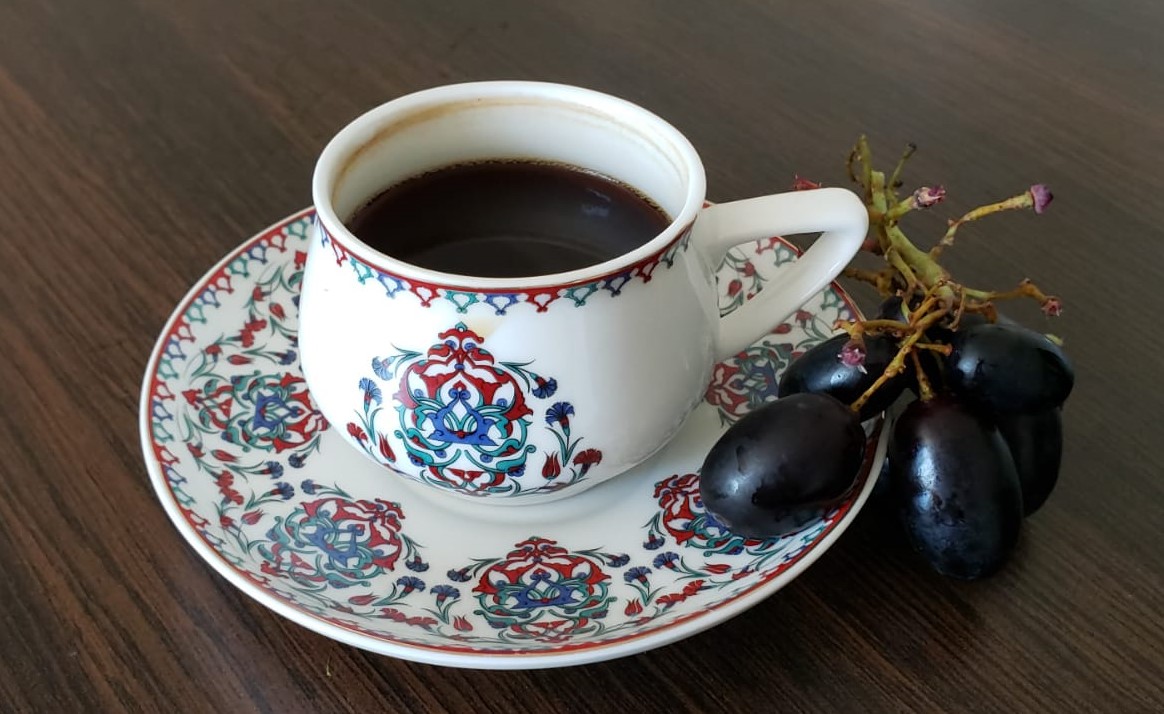Coffee القَهْوة and Tea الشَّاي in Arab Culture Posted by yasmine on Oct 23, 2019 in Arabic Language, Culture
Whether they call it Turkish or Arabic coffee, both refer to the same method of coffee preparation. The ground beans are boiled in a special pot called إبْريق ibreeq. The coffee is boiled with sugar and sometimes cardamom هَيل hail then served in a small cup called فِنْجان finjan and allowed to sit for a few moments for the grounds to settle. It is never served with cream or milk but is always served with a thick foam رَغْوة raghweh on top. Arabs consider the more foam, the better the coffee. There are variations of Arabic coffee which are regionally based. For example, in the Gulf, cardamom, cinnamon قِرفة qirfeh and saffron زَعفران za’faran are added. Have you tried Arabic coffee?
Ordering Arabic Coffee
When ordering Arabic/Turkish coffee at an Arabic coffee shop, don’t forget to say how much sugar if any, you prefer. Sugar is added during the brewing process not after. If you prefer no sugar, you can ask for قَهْوة سادة qahweh Sadeh meaning “plain” or black coffee. Or if you prefer a bit of sugar, you can say قَهْوة وَسط qahweh waSaT meaning coffee that’s in the “middle” in terms of sweetness, and قَوة حلوى qahweh Helwa for “sweet” coffee.
Historically speaking, the concept of a coffee house المَقْهى al-maqha was first created in the Middle East not only as a place for drinking coffee but also to socialize and play backgammon الطّاولة aTawileh.
While on the go, one can park by tiny Arabic coffee shops along the street and signal the order from the car window, or a man will come by the window to take the order. Such tiny hole in the wall coffee shops are often named after the owner, such as قهوة أبو صالح or قهوة أبو هيثم meaning “the father of Saleh” or “the father of Haitham”.
American coffee is also consumed in the Arab world. Especially after the wide spread of Nescafe. You’ll also find that some people associate American coffee with Western style café culture. Many Arab countries for example have Starbucks and other Western Café franchises.
When is Coffee Served?
Arabic or Turkish coffee is usually served before breakfast, and tea is served with breakfast. Coffee can also be served in the office, during meetings, during visits, at funerals and after dinner. In other words, there are countless occasions where one can expect to have coffee.
According to custom, the person or host pouring the coffee pours coffee with the left hand and offers the cup with the right. The guest must also take the coffee with his/her right hand. It is also accustomed for the one pouring coffee to stay standing while the guests sip their coffee. The host watches to see who has finished to instantly offer them more. Sometimes guests signal that they would not like more by tilting the empty cup side to side.
Types of Teas in Arabic
For the tea lovers, Arabs mostly drink black tea, but green tea شاي أخضَر shay akhDar and herbal teas شاي الأعشاب shay al-a’shab are also very common, such as chamomile tea شاي البابونَج shay al-baboonaj. People also add lemon لَيْمون laymoon and mint نَعْناع na’naa’.
When visiting a house or office, expect to always be offered the choice of either tea or coffee. If you are invited to a dinner, expect tea and dessert to be served after dinner and coffee by itself before guests are about to leave.
هل تُحِب القَهوة أو الشَّاي؟ ☕
hal tuhib al-qahwa aw a-shay?
Are you a قَهْوة qahweh or شَّاي shay person? ☕

Build vocabulary, practice pronunciation, and more with Transparent Language Online. Available anytime, anywhere, on any device.





Comments:
meg:
I love your blogs, they help my stumbling arabic a lot. Please keep posting them and thank you for making the effort